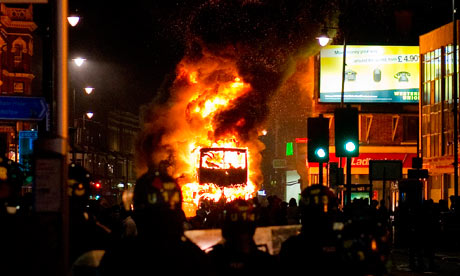The ethics of riots
August 8, 2011
Can the violence and looting in Tottenham ever be justified?
In 1981 I found myself living in Bethnal Green during the Brixton riots. Every day for a couple of weeks there were coach loads of police parked in my street in full riot gear. The shops were all boarded up. People prepared for violence. That year the violence passed us by.
This weekend Tottenham has erupted in violence with copycat lootings and burnings in Enfield and Brixton (and since I wrote this, other cities and other boroughs). The trigger was the death of a wanted  man, Mark Duggan, who was shot dead by Police on Thursday after his taxi was pulled over by pursuing Police. Family and friends demanded an explanation. Others so it appears took this as an opportunity to smash shop windows and take the latest flatscreen TVs, iphones and so on. What are we to make ethically of this unexpected upsurge in violence?
man, Mark Duggan, who was shot dead by Police on Thursday after his taxi was pulled over by pursuing Police. Family and friends demanded an explanation. Others so it appears took this as an opportunity to smash shop windows and take the latest flatscreen TVs, iphones and so on. What are we to make ethically of this unexpected upsurge in violence?
Morality is very close to law, though not precisely the same. That’s why Kant and others have talked about the moral law, whilst recognising that this law is not quite the same as that passed by Parliament. You are no longer stoned for adultery as in the Old Testament law, but adultery could still be argued as morally wrong.
But before we point our fingers at rampaging youths in hoods with baseball bats ask yourself this question. If you find a valuable phone left on a park bench, do you keep it? Do you download music and dvds without paying on the internet? Have you ever bought a dodgy dvd from someone touting on the shopping centre pavement?
In one sense all these are forms of the same crime – opportunistic theft done because you can get away with it. You are an inner city youth and your friends say, as Sonny Twag tweeted on Saturday night “want to roll Tottenham to loot. I do want a free TV. Who wudn’t?” Consumerism has placed this ideology of branded identity and recurrent feelings that if you don’t have it you’re somehow lacking as a person. Who doesn’t want an ipad and an ipod?
Yet this action seems wrong from every moral theory we study. You cannot universalise looting and burning (using the Kantian insights) because it is a contradiction in will to want your own house or business looted and burnt. Imagine how the uninsured 30 householders of that torched building in Tottenham High Street feel this morning. They have lost everything. And what of Aaron Biber aged 89, standing outside his wrecked hairdressing salon that perhaps he has spent a lifetime building up? Or the owners of the furniture store in Croydon which survived the blitz?
Even wrecking the retail park has consequences. Large organisations will be less willing to locate in poorer inner city areas. Shop workers will be out of work. People will go elsewhere for their shopping and Tottenham will die further as a community. It’s even said that this might be a reason for chairman Daniel Levy to pull out of White Hart Lane just as a resurgent Tottenham FC, with all that means for the morale and identity of Tottenham itself, was about to challenge for the league title.
Theft has consequences and is wrong not just because property belongs to someone else, but because it shows a failure of imagination to see how one isolated act knocks on to a society which is far less likely to flourish compared with one where theft and violence are seen as completely and unquestionably taboo.






0 Comments